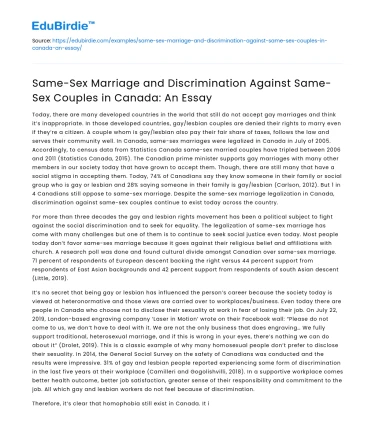Today, there are many developed countries in the world that still do not accept gay marriages and think it’s inappropriate. In those developed countries, gay/lesbian couples are denied their rights to marry even if they’re a citizen. A couple whom is gay/lesbian also pay their fair share of taxes, follows the law and serves their community well. In Canada, same-sex marriages were legalized in Canada in July of 2005. Accordingly, to census data from Statistics Canada same-sex married couples have tripled between 2006 and 2011 (Statistics Canada, 2015). The Canadian prime minister supports gay marriages with many other members in our society today that have grown to accept them. Though, there are still many that have a social stigma in accepting them. Today, 74% of Canadians say they know someone in their family or social group who is gay or lesbian and 28% saying someone in their family is gay/lesbian (Carlson, 2012). But 1 in 4 Canadians still oppose to same-sex marriage. Despite the same-sex marriage legalization in Canada, discrimination against same-sex couples continue to exist today across the country.
For more than three decades the gay and lesbian rights movement has been a political subject to fight against the social discrimination and to seek for equality. The legalization of same-sex marriage has come with many challenges but one of them is to continue to seek social justice even today. Most people today don’t favor same-sex marriage because it goes against their religious belief and affiliations with church. A research poll was done and found cultural divide amongst Canadian over same-sex marriage. 71 percent of respondents of European descent backing the right versus 44 percent support from respondents of East Asian backgrounds and 42 percent support from respondents of south Asian descent (Little, 2019).
Save your time!
We can take care of your essay
- Proper editing and formatting
- Free revision, title page, and bibliography
- Flexible prices and money-back guarantee
It’s no secret that being gay or lesbian has influenced the person’s career because the society today is viewed at heteronormative and those views are carried over to workplaces/business. Even today there are people in Canada who choose not to disclose their sexuality at work in fear of losing their job. On July 22, 2019, London-based engraving company ‘Laser in Motion’ wrote on their Facebook wall: “Please do not come to us, we don’t have to deal with it. We are not the only business that does engraving… We fully support traditional, heterosexual marriage, and if this is wrong in your eyes, there’s nothing we can do about it” (Drolet, 2019). This is a classic example of why many homosexual people don’t prefer to disclose their sexuality. In 2014, the General Social Survey on the safety of Canadians was conducted and the results were impressive. 31% of gay and lesbian people reported experiencing some form of discrimination in the last five years at their workplace (Camilleri and Gogolishvilli, 2018). In a supportive workplace comes better health outcome, better job satisfaction, greater sense of their responsibility and commitment to the job. All which gay and lesbian workers do not feel because of discrimination.
Therefore, it’s clear that homophobia still exist in Canada. It is necessary that the Canadian government recognize that equal rights should be offered to a citizen regardless of race, gender or sexual orientation. To correct this, first step is to improve the social injustice. Many gay/lesbians couples still face discrimination in employment or workplace, housing market and having been victims of hate crimes and verbal harassment and continue to be because of the discriminatory laws. They are held at an unfair disadvantage because of these types of discrimination. The discrimination must stop because same-sex couples just like heterosexual couples are law abiding citizens and should be viewed/looked upon the same way.
Did you like this example?
Make sure you submit a unique essay
Our writers will provide you with an essay sample written from scratch: any topic, any deadline, any instructions.
Cite this paper
-
APA
-
MLA
-
Harvard
-
Vancouver
Discrimination in Same-Sex Marriage in Canada.
(2022, October 28). Edubirdie. Retrieved December 22, 2024, from https://edubirdie.com/examples/same-sex-marriage-and-discrimination-against-same-sex-couples-in-canada-an-essay/
“Discrimination in Same-Sex Marriage in Canada.” Edubirdie, 28 Oct. 2022, edubirdie.com/examples/same-sex-marriage-and-discrimination-against-same-sex-couples-in-canada-an-essay/
Discrimination in Same-Sex Marriage in Canada. [online].
Available at: <https://edubirdie.com/examples/same-sex-marriage-and-discrimination-against-same-sex-couples-in-canada-an-essay/> [Accessed 22 Dec. 2024].
Discrimination in Same-Sex Marriage in Canada [Internet]. Edubirdie.
2022 Oct 28 [cited 2024 Dec 22].
Available from: https://edubirdie.com/examples/same-sex-marriage-and-discrimination-against-same-sex-couples-in-canada-an-essay/
copy






 Stuck on your essay?
Stuck on your essay?

